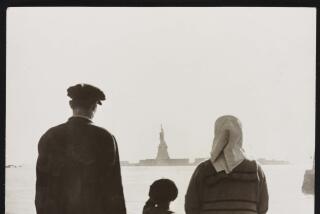Review: Beyond the ‘Gins-burn’: The documentary ‘RBG’ shows the formidable soft power of Ruth Bader Ginsburg
- Share via
No other Supreme Court justice, living or dead, has had a hold on the American popular imagination like Ruth Bader Ginsburg. But if you think never is heard a discouraging word where she is concerned, the stirring documentary “RBG” sets you straight from the start.
Though it sounds unlikely for someone who’s been the inspiration for everything from “Saturday Night Live” skits and a best-selling “Notorious RBG” biography to sleepwear, workout routines and even tattoos, numerous imprecations have flown in the justice’s direction.
In fact, co-directors Betsy West and Julie Cohen have chosen to begin their completely engrossing film with audio of angry anti-Ginsburg language on the order of “evil doer,” “monster,” “witch,” “zombie,” even “vile human being.”
That is pretty strong language to use to refer to a tiny 84-year-old grandmother who never raises her voice because she was taught by her mother that getting angry is a waste of time.
But make no mistake about it, this woman is a force, and the great service this clear-eyed and admiring documentary provides is to emphasize not just Ginsburg’s work on the court but how extraordinarily influential she was before she even got there.
“She’s the closest thing to a superhero I know,” says activist Gloria Steinem. “She quite literally changed the way the world is for American women.”
But as West and Cohen, documentarians with extensive television experience, understand, Ginsburg’s story is not a dry, strictly professional chronicle.
Her personal life, from her upbringing as a first-generation American in Brooklyn, New York, to her storybook romance and decades-long marriage, were crucial in allowing her to be who she’s become.
“RBG” has cast a wide net in terms of interviews, talking to everyone from children and grandchildren to childhood friends who remember her lack of interest in small talk to current personal trainer Bryant Johnson who admiringly says the justice is “like a cyborg.”
Best of all is the time spent with Ginsburg herself, who as a subject is both eloquent and candid. And it’s not just that we hear her speak; her language is so powerful and incisive it feels like are actually watching her think.
Ginsburg, we learn, was deeply influenced by her mother, who died the day before the future justice’s high school graduation. The lessons she was taught were to be independent and to be a lady, which meant not being distracted by wasted emotions like anger and resentment.
Ruth Bader met Martin Ginsburg, her future husband of more than 50 years, when both were students at Cornell. She was attracted both to his belief, unusual for the time, in equality between the sexes, and to a gregarious personality and easy-going sense of humor that was so opposite to her own.
The couple’s lifelong devotion to each other, visible in news and home movie clips, was palpable (Martin Ginsburg died in 2010), and the directors’ emphasis on it is a key factor in making the film warmer and more human than might be imagined.
“RBG” details the formidable barriers to women in the legal profession, even for someone as demonstrably brilliant as Ginsburg, which led to her involvement in the American Civil Liberties Union’s Women’s Rights Project.
As the ACLU’s general counsel, Ginsburg proved to be a brilliant litigator who made the Supreme Court pay attention to gender equality in a series of cases, one of which, 1975’s Weinberger v. Wiesenfeld (dramatized with Felicity Jones playing Ginsburg in “On the Basis of Sex,” a feature film due out in November), showed how men can also fall victim to sex-based discrimination.
Ginsburg was appointed to the Supreme Court by Bill Clinton in 1993 (his interview describing why he picked her is especially engaging), and one of the paradoxes “RBG” points out is that the justice is by nature a consensus builder. It was the court’s steady move to the right, not her philosophy or nature, that turned her into the great dissenter.
She’s the closest thing to a superhero I know. She quite literally changed the way the world is for American women.
— Gloria Steinem
Ginsburg’s personal paradoxes get equal airtime. “I tend to be rather sober,” is how she describes herself, with her kids remembering they kept a book recording the infrequent times “Mommy Laughed.”
But she formed a deep and lasting friendship, based initially on their mutual love of opera, with her ideological and personal opposite, the extroverted, late Justice Antonin Scalia.
“RBG” uses Ginsburg’s confirmation hearing testimony as a spine for its narrative, especially her heartfelt declaration that “what has happened to me could happen only in America.”
Even ideological opponents such as Republican Sen. Orrin Hatch seem to be impressed by the way the arc of Ginsburg’s life exemplifies the American dream, showing this country working as advertised. I can’t think of a dramatic film on screen right now that will make you feel this good, and that’s a fact.
“RBG”
No MPAA rating.
Running time: 1 hour, 37 minutes.
Playing: Arclight, Hollywood; Landmark, West Los Angeles.
ALSO
Ruth Bader Ginsburg and Fred Rogers documentaries hail soft voices behind powerful messages
The authors of ‘Notorious RBG’ on why they first started a Tumblr about Ruth Bader Ginsburg
More to Read
Only good movies
Get the Indie Focus newsletter, Mark Olsen's weekly guide to the world of cinema.
You may occasionally receive promotional content from the Los Angeles Times.











